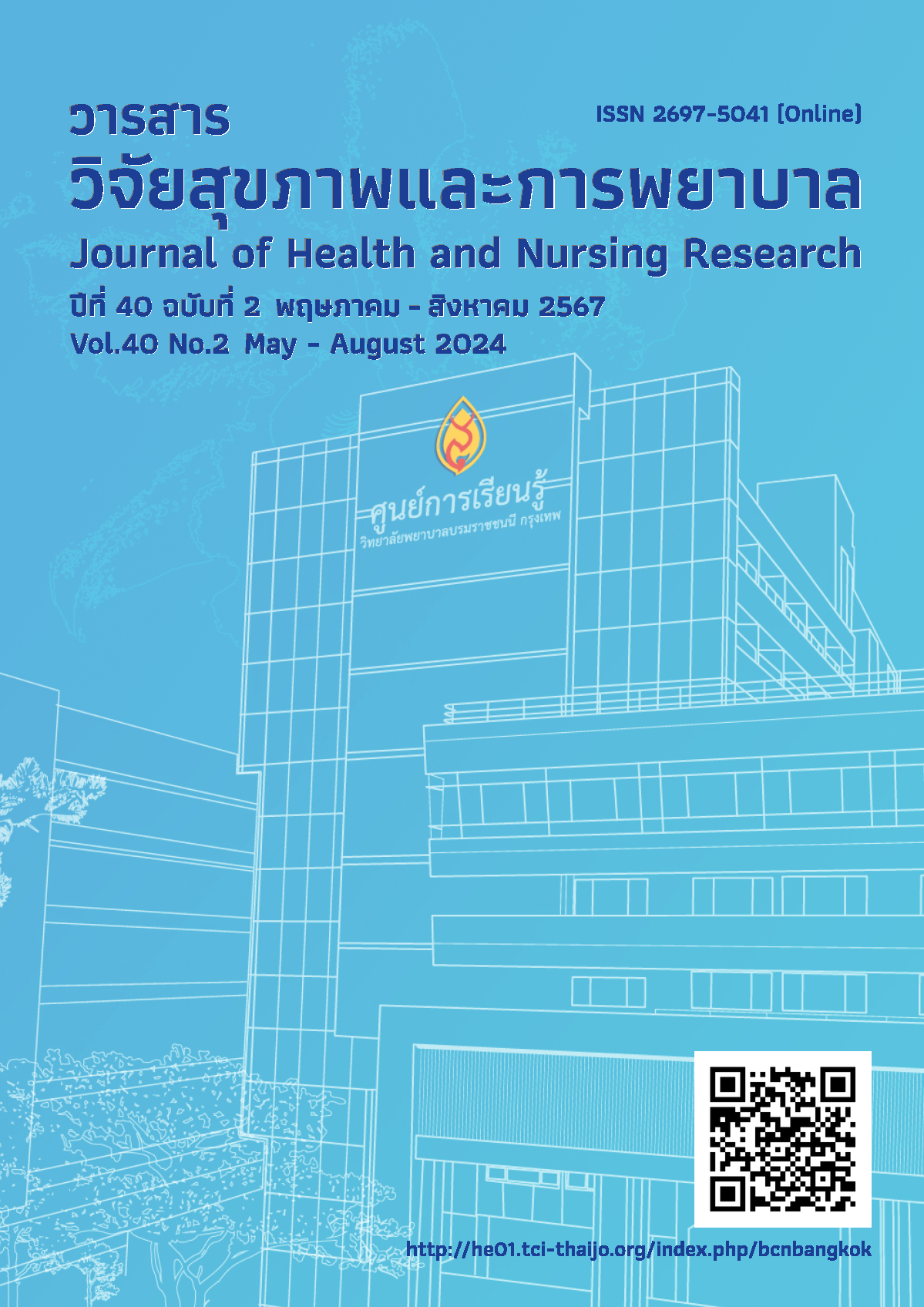ผลของโปรแกรมการให้ความรู้ตามแบบแผนความเชื่อด้านสุขภาพ ของผู้ป่วยโรคเบาหวานชนิดที่ 2 โรงพยาบาลส่งเสริมสุขภาพตำบลดงติ้ว
คำสำคัญ:
โปรแกรมการให้ความรู้, แบบแผนความเชื่อด้านสุขภาพ, โรคเบาหวานชนิดที่ 2บทคัดย่อ
บทนำ: โรคเบาหวานชนิดที่ 2 เป็นโรคเรื้อรังที่รักษาไม่หายขาด แบบแผนความเชื่อด้านสุขภาพเป็นสิ่งสำคัญในการปรับเปลี่ยนพฤติกรรม และความรู้ของผู้ป่วยโรคเบาหวานชนิดที่ 2
วัตถุประสงค์การวิจัย: เพื่อศึกษาผลของโปรแกรมการให้ความรู้ตามแบบแผนความเชื่อด้านสุขภาพต่อความรู้ และพฤติกรรมการดูแลตนเองของกลุ่มผู้ป่วยโรคเบาหวานชนิดที่ 2
ระเบียบวิธีวิจัย: การศึกษานี้เป็นการวิจัยกึ่งทดลอง แบบหนึ่งกลุ่มวัดก่อนและหลัง กลุ่มตัวอย่าง คือ ผู้ป่วยโรคเบาหวานชนิดที่ 2 อายุ 35 ปีขึ้นไป คัดเลือกแบบสุ่มอย่างง่าย เลือกตามคุณสมบัติของกลุ่มตัวอย่างที่กำหนด จำนวน 33 คน ระยะเวลาดำเนินการวิจัย 12 สัปดาห์ เครื่องมือที่ใช้ในการเก็บรวบรวมข้อมูล ได้แก่ แบบสอบถามข้อมูลส่วนบุคคล แบบสอบถามความรู้เรื่องโรคเบาหวาน การรับรู้ตามแบบแผนความเชื่อด้านสุขภาพ และแบบสอบถามพฤติกรรมสุขภาพ เครื่องมือที่ใช้ในการทดลอง ได้แก่ โปรแกรมการให้ความรู้ตามแบบแผนความเชื่อด้านสุขภาพของผู้ป่วยโรคเบาหวานชนิดที่ 2 วิเคราะห์ข้อมูลโดยใช้ค่าเฉลี่ยร้อยละ ส่วนเบี่ยงเบนมาตรฐาน และสถิติ Paired t - test
ผลการวิจัย: พบว่า กลุ่มทดลองมีค่าเฉลี่ยความรู้และพฤติกรรมสูงกว่า ก่อนเข้าร่วมโปรแกรมอย่างมีนัยสำคัญทางสถิติ (p < .001)
สรุปผล: โปรแกรมนี้สามารถเพิ่มความรู้ และพฤติกรรมของผู้ป่วยโรคเบาหวานชนิดที่ 2 สถานบริการสุขภาพและผู้สนใจสามารถนำโปรแกรมนี้ไปประยุกต์ใช้กับผู้ดูแลโรคเรื้อรังอื่น ๆ ได้ พยาบาลที่ปฏิบัติงานในสถานบริการสุขภาพ สามารถจัดกิจกรรมส่งเสริมความรู้ และพฤติกรรมของผู้ป่วยโรคเบาหวานชนิดที่ 2
ข้อเสนอแนะ: พยาบาลควรนำโปรแกรมนี้ไปใช้เพื่อปรับเปลี่ยนพฤติกรรมผู้ป่วยโรคเบาหวานชนิดที่ 2
Downloads
เอกสารอ้างอิง
IDF Diabetes Atlas. 10th ed. 537 million adults are living with Diabetes worldwide. Belgium: International Diabetes federation [Internet]. 2021 [cite 2023 Jan 11]. Available from: https://diabetesatlas.org/atlas/tenth-edition/
Division of Noncommunicable Diseases, Department of Disease Control. NCD clinic plus operations manual, year 2020. Nonthaburi: Graphic Fonts and Design; 2020. (in Thai)
Becker MH. The health belief model and sick role behavior. Health Education Monographs. 1974;2(4):409-19.
Bootsri W, Boonpha R, Singban C. The effect of education program on self-care behavior and blood glucose control in uncontrolled type 2 Diabetes. UMT Poly Journal ISSN 2021;18(1):13-25. (in Thai)
Hunthayung D, Waengnork W, Kriengkaisakda W, The effects of an applied health belief model program on self-care behaviors of Diabetic patients in Meung-Pai Sub - district health promotion hospital zone. Phranakhon Rajabhat Research Journal (Science and Technology) 2016;11(1):36-51. (in Thai)
Nakhon Phanom Provincial Public Health Office. Diabetes morbidity rate 2017-2019. [Internet]. 2019 [cited 2019 Nov 17]. Available from: https://npm.hdc.moph.go.th/hdc/reports/report.php?&cat_id=6a1fdf282fd28180eed7d1cfe0155e11&id=cefa42b9223ec4d1969c5ce18d762bdd (in Thai)
Dong Tiew Subdistrict Health Promoting Hospital, Medical records of Dong Tiew Subdistrict Health Promoting Hospital (2020) Annual patient report: bound document; 2021. (in Thai)
Lalun A, Wirunphan B. Effects of self-management programs on hemoglobin A1C levels and quality of life in people with diabetes mellitus in the district of Kanghhro Hospital, Chaiyaphum Province. Journal of Boromarajonani College of Nursing, Surin 2021;11(1):66-80. (in Thai)
Wichaiyo W, Chongsamak P, Chaitong S, khotabutda S. The effect of the applying health belief model program of vascular disease preventive in patients with hypertension and diabetes mellitus at Namon District, Kalasin Province. Research and Development Health System Journal 2021;14(2):25-35. (in Thai)
Faul F, Erdfelder E, Lang AG, Buchner A. G*Power 3: a flexible statistical power analysis program for the social, behavioral, and biomedical sciences. Behavior Research Methods. 2007;39(2):175-91. doi: 10.3758/bf03193146
Promdee O, Thiangtham V, Pitchayapinyo P. Chronic kidney failure prevention program in patients type 2 diabetes in which blood sugar levels cannot be controlled. Public Health Nursing Journal 2023;30(3):102-11. (in Thai)
Ban Tha Kham Subdistrict Health Promoting Hospital. Self-care behavior of the diabetes mellitus patients in Maehia sub district, Muang Chiangmai district, Chiangmai. Available from: https://www.nkp-hospital.go.th/th/H.ed/mFile/20180316191617.pdf. (in Thai)
Joseph F. Hair Jr, William C. Black, Barry J. Babin, Rolph E. Anderson. Multivariate data analysis 7th ed: Pearson; 2010.
Surakri Hnuban, Araya Pranprawit, Sarodh Pechmanee. Effects of group process and health belief model on self-care behavior for preventing Diabetes among the group at risk of diabetes in Vibhawdi district Suratthani province. Journal of Graduate Research 2016;7(1):101-14. Available from: https://so02.tci-thaijo.org/index.php/banditvijai/article/view/96472 (in Thai)
Fazel ZM, Sharifirad G, Jalilian F, Alavijeh FM, Aghaei A, Ahmadi-Jouibari T. Effectiveness of educational programs to promote nutritional knowledge in type II Diabetes patients based on health belief model. Journal of Health Science Research 2023;9(4):412-20.
ดาวน์โหลด
เผยแพร่แล้ว
รูปแบบการอ้างอิง
ฉบับ
ประเภทบทความ
สัญญาอนุญาต
ลิขสิทธิ์ (c) 2024 วารสารวิจัยสุขภาพและการพยาบาล (วารสารวิทยาลัยพยาบาลบรมราชชนนี กรุงเทพ)

อนุญาตภายใต้เงื่อนไข Creative Commons Attribution-NonCommercial 4.0 International License.
บทความที่ได้รับการตีพิมพ์ เป็นลิขสิทธิ์ของวารสารวิจัยสุขภาพและการพยาบาล (วิทยาลัยพยาบาลบรมราชชนนี กรุงเทพ) ไม่สามารถนำไปตีพิมพ์ซ้ำในวารสารฉบับอื่น


















